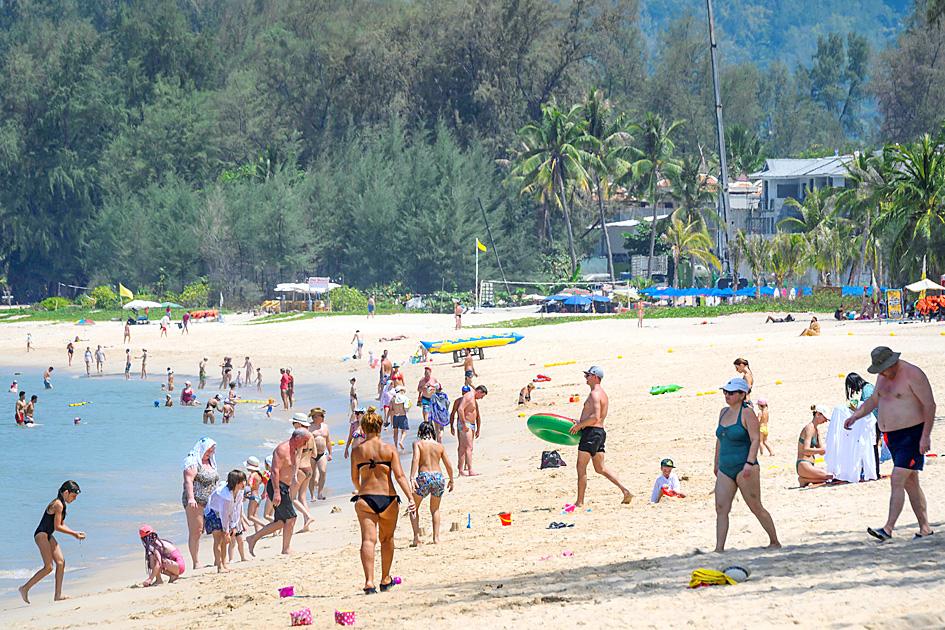Thousands of Russian tourists are stranded in Thailand’s beach resorts because of the war in Ukraine, many unable to pay their bills or return home because of sanctions and canceled flights.
The crisis in Europe also put a crimp in recovery plans for the Southeast Asian nation’s tourism industry, which has hosted more visitors from Russia than any of its neighbors before the COVID-19 pandemic hit.
There are about 6,500 Russian tourists stuck in Phuket, Surat Thani, Krabi and Pattaya, four provinces that are popular seaside resort destinations, in addition to 1,000 Ukrainians, Yuthasak Supasorn, governor of the Tourism Authority of Thailand, told reporters on Friday.

Photo: AFP
About 17,599 Russians accounted for the largest bloc of arrivals last month, representing 8.6 percent of a total of 203,970, according to the Thai Ministry of Public Health.
After the Feb. 24 Russian invasion of Ukraine, their numbers drastically declined.
Yuthasak said the Russians face two main problems: Cancelations of their flights home by airlines that have stopped flying to Russia and suspension of financial services, particularly by credit card companies that have joined sanctions against Moscow. There are also some who prefer to delay their return.
“There are some airlines that still fly to Russia, but travelers have to transit in another country. We are trying to coordinate and search the flights for them,” Yuthasak said.
While almost all direct flights from Russia have been suspended, connections are still available through major carriers based in the Middle East.
He said efforts are also being made to find alternative methods of payments for Russian tourists.
Siwaporn Boonruang, a volunteer translator for Russians stranded in Krabi, said some cannot pay their bills because they can no longer use Visa or Mastercard credit cards.
Many have cash and those with UnionPay credit cards, which are issued by a Chinese financial services company, can still use them, but payment by cryptocurrency is not allowed, she said.
Many hotels have helped by offering discounted rates, she added.
Thailand’s government has offered 30-day visa extensions without payment, and is trying to find low-cost alternative accommodation for people forced to stay for an extended period.
The problems associated with the war in Ukraine have compounded Thailand’s hopes for economic recovery. Officials hope to see the threat from the pandemic ebbing by July, even though daily cases are at record highs, driven by the Omicron variant of SARS-CoV-2.
Thai authorities later this year expect to drop most quarantine and testing regulations that have been in place to fight the spread of the virus, which would make entry easier for foreign travelers.
Thailand might have to lower its targets for tourist arrivals and revenues this year because of the knock-on effects of rising oil prices and inflation on global travel, Yuthasak was quoted saying by the Bangkok Post newspaper.
“Tourism is still a key engine to revive our economy, even though revenue was stymied by negative factors,” he said.
According to the report, Thailand had projected gaining a total of 1.28 trillion baht (US$38.4 billion) in revenue this year from foreign and domestic tourists.

Archeologists in Peru on Thursday said they found the 5,000-year-old remains of a noblewoman at the sacred city of Caral, revealing the important role played by women in the oldest center of civilization in the Americas. “What has been discovered corresponds to a woman who apparently had elevated status, an elite woman,” archeologist David Palomino said. The mummy was found in Aspero, a sacred site within the city of Caral that was a garbage dump for more than 30 years until becoming an archeological site in the 1990s. Palomino said the carefully preserved remains, dating to 3,000BC, contained skin, part of the

‘WATER WARFARE’: A Pakistani official called India’s suspension of a 65-year-old treaty on the sharing of waters from the Indus River ‘a cowardly, illegal move’ Pakistan yesterday canceled visas for Indian nationals, closed its airspace for all Indian-owned or operated airlines, and suspended all trade with India, including to and from any third country. The retaliatory measures follow India’s decision to suspend visas for Pakistani nationals in the aftermath of a deadly attack by shooters in Kashmir that killed 26 people, mostly tourists. The rare attack on civilians shocked and outraged India and prompted calls for action against their country’s archenemy, Pakistan. New Delhi did not publicly produce evidence connecting the attack to its neighbor, but said it had “cross-border” links to Pakistan. Pakistan denied any connection to

TRUMP EFFECT: The win capped one of the most dramatic turnarounds in Canadian political history after the Conservatives had led the Liberals by more than 20 points Canadian Prime Minister Mark Carney yesterday pledged to win US President Donald Trump’s trade war after winning Canada’s election and leading his Liberal Party to another term in power. Following a campaign dominated by Trump’s tariffs and annexation threats, Carney promised to chart “a new path forward” in a world “fundamentally changed” by a US that is newly hostile to free trade. “We are over the shock of the American betrayal, but we should never forget the lessons,” said Carney, who led the central banks of Canada and the UK before entering politics earlier this year. “We will win this trade war and

Armed with 4,000 eggs and a truckload of sugar and cream, French pastry chefs on Wednesday completed a 121.8m-long strawberry cake that they have claimed is the world’s longest ever made. Youssef El Gatou brought together 20 chefs to make the 1.2 tonne masterpiece that took a week to complete and was set out on tables in an ice rink in the Paris suburb town of Argenteuil for residents to inspect. The effort overtook a 100.48m-long strawberry cake made in the Italian town of San Mauro Torinese in 2019. El Gatou’s cake also used 350kg of strawberries, 150kg of sugar and 415kg of